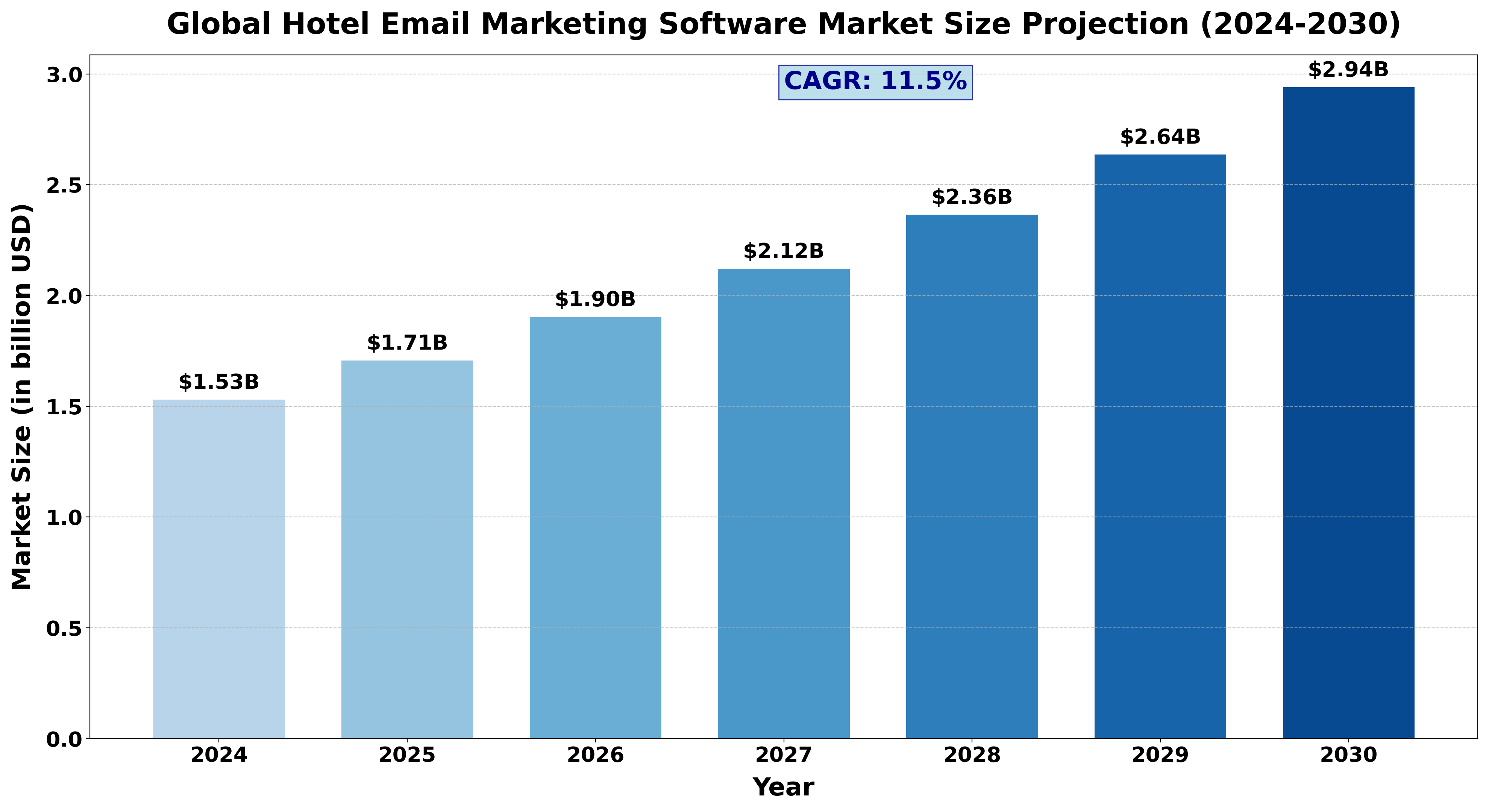TOP CATEGORY: Chemicals & Materials | Life Sciences | Banking & Finance | ICT Media

Download Report PDF Instantly
Report overview
Report Overview
The Global Hotel Email Marketing Software Market was valued at US$ 1.53 billion in 2024 and is projected to reach US$ 2.94 billion by 2030, exhibiting a Compound Annual Growth Rate (CAGR) of 11.5% during the forecast period (2024-2030).
Hotel Email Marketing Software is service-based software that hotels use for email marketing. Email marketing has become an essential tool in the hospitality industry, allowing hotels to engage directly with guests and prospective customers. With the rise in digital marketing, hotels are leveraging sophisticated email marketing software to deliver personalized experiences, boost guest loyalty, and drive bookings.
This report provides a deep insight into the global Hotel Email Marketing Software market covering all its essential aspects. This ranges from a macro overview of the market to micro details of the market size, competitive landscape, development trend, niche market, key market drivers and challenges, SWOT analysis, value chain analysis, etc.
The analysis helps the reader to shape the competition within the industries and strategies for the competitive environment to enhance the potential profit. Furthermore, it provides a simple framework for evaluating and accessing the position of the business organization. The report structure also focuses on the competitive landscape of the Global Hotel Email Marketing Software Market, this report introduces in detail the market share, market performance, product situation, operation situation, etc. of the main players, which helps the readers in the industry to identify the main competitors and deeply understand the competition pattern of the market.

In a word, this report is a must-read for industry players, investors, researchers, consultants, business strategists, and all those who have any kind of stake or are planning to foray into the Hotel Email Marketing Software market in any manner.
Engagement Rates on the Rise
Studies show that email open rates for the hospitality industry average around 22%, with click-through rates hovering near 2.5%. The effectiveness of personalized, segmented campaigns in this sector has raised open rates to over 29%, proving that tailored content is increasingly catching the attention of recipients. This is particularly impactful during holiday seasons, where targeted promotions can increase open rates by up to 40%.
Personalization is Key
Over 70% of hotel guests expect communications to be customized to their preferences and past interactions. Email marketing software with advanced segmentation and AI-driven personalization enables hotels to deliver relevant messages at the right time, significantly improving customer satisfaction and loyalty. In fact, personalized emails see a 5.7% higher conversion rate than generic broadcasts, highlighting the need for tailored content in boosting bookings.
Retention Through Loyalty Programs
Hotels leveraging email marketing software for loyalty program updates have reported increased engagement rates. Roughly 63% of travelers are more likely to open an email if it includes loyalty rewards or special member-only discounts. Loyalty-focused emails generate around 30% of overall hotel email revenue, emphasizing the importance of nurturing existing guests for long-term business growth.
Mobile Optimization Drives Interaction
With over 54% of hotel-related emails opened on mobile devices, optimizing content for smartphones is essential. Emails that are mobile-responsive lead to 15% higher click-through rates and 8% more conversions. This trend underscores the need for mobile-friendly designs, quick-loading visuals, and concise messaging to engage users effectively.
Automated Campaigns Enhance Efficiency
Automation is a game-changer in the hospitality industry, with nearly 60% of hotels using automated workflows to manage guest communication. Automated campaigns, such as booking confirmations, pre-arrival messages, and post-stay follow-ups, save valuable time and maintain consistency in guest interactions. Hotels using automation see a 17% increase in guest satisfaction scores due to timely, relevant communication.
Abandoned Booking Recovery Emails
On average, 75% of online hotel bookings are abandoned before completion. However, recovery emails sent through email marketing software recapture around 10-15% of these lost bookings. Recovery emails that are sent within the first hour of abandonment see the highest engagement, with a 20% higher chance of leading to a completed booking.
Event-Specific Campaigns Boost ROI
Hotels have seen a significant return on investment (ROI) with event-specific email campaigns, such as for weddings, conferences, or holiday getaways. Open rates for these targeted emails are about 15% higher than standard promotional campaigns. Additionally, hotels that use email marketing software to automate event follow-ups have a 23% increase in repeat bookings from past guests.
Survey and Feedback Engagement
Collecting guest feedback through post-stay surveys has become standard practice, with around 65% of hotels sending follow-up emails within two days of check-out. These emails have an average response rate of 30%, providing hotels with valuable insights to improve service quality and guest satisfaction. Integrated survey tools within email marketing software have been linked to a 12% rise in positive reviews on travel websites.
Global Hotel Email Marketing Software Market: Market Segmentation Analysis
Email marketing software is a powerful tool for hotels aiming to improve guest engagement, drive bookings, and enhance loyalty. As these statistics show, personalization, mobile optimization, automation, and timely communication are vital components of successful email campaigns in the hospitality sector.
The research report includes specific segments by region (country), manufacturers, Type, and Application. Market segmentation creates subsets of a market based on product type, end-user or application, Geographic, and other factors. By understanding the market segments, the decision-maker can leverage this targeting in the product, sales, and marketing strategies. Market segments can power your product development cycles by informing how you create product offerings for different segments.
Key Company